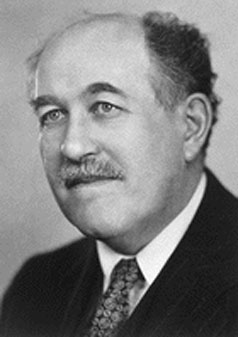<Back to Index>
- Physicist Otto Stern, 1888
- Painter Raphaelle Peale, 1774
- Politician André Maginot, 1877

Otto Stern (17 February 1888 – 17 August 1969) was a German physicist and Nobel laureate in physics.
Stern was born in Sohrau, now Żory in the German Empire's Kingdom of Prussia (now in Poland) and studied at Breslau, now Wrocław in Lower Silesia.
Stern completed his studies at the University of Breslau in 1912 with a doctor's degree in physical chemistry. He then followed Albert Einstein to Charles University in Prague and later to ETH Zurich. Stern received his Habilitation at the University of Frankfurt in 1915 and in 1921, he became a professor at the University of Rostock, which he left in 1923 to work at the newly founded Institut für Physikalische Chemie at the University of Hamburg. After resigning from his post at the University of Hamburg in 1933 because of the Nazis' Machtergreifung (seizure of power), he became professor of physics at the Carnegie Institute of Technology and later professor emeritus at the University of California, Berkeley. As an experimental physicist Stern contributed to the discovery of spin quantization in the Stern-Gerlach experiment with Walther Gerlach in 1922; demonstration of the wave nature of atoms and molecules; measurement of atomic magnetic moments; discovery of the proton's magnetic moment; and development of the molecular ray method which is utilized for the technique of molecular beam epitaxy. He was awarded the 1943 Nobel Prize in Physics,
the first to be awarded since 1939. He was the sole recipient in
Physics that year, and the award citation omitted mention of the Stern-Gerlach experiment, as Gerlach had remained active in Nazi-led Germany.